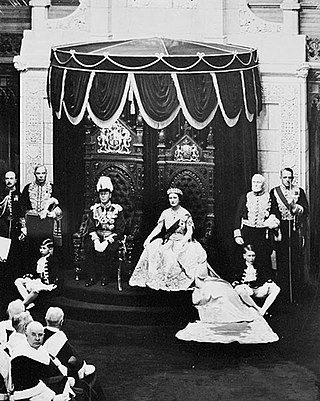This article needs additional citations for verification .(November 2024) |
An act of Tynwald is a statute passed by Tynwald, the parliament of the Isle of Man. [1]
This article needs additional citations for verification .(November 2024) |
An act of Tynwald is a statute passed by Tynwald, the parliament of the Isle of Man. [1]
Acts of Tynwald are structured in a similar format to Acts of the Parliament of the United Kingdom.
Originally, each Act began with the following formula:
At a Tynwald Court holden at [town], the [day] Day of [month] in the [regnal year] Year of the Reign of our Sovereign Lord [king], by the Grace of God of Great Britain, France, and Ireland, King, Defender of the Faith, and so forth, and in the Year of our Lord [year in words], before the Most Noble [name of Duke], Duke of Atholl, Governor in Chief, the Council, Deemsters, and Keys of the said Isle.
In later Acts, this was modernised as follows:
At a Tynwald held at Douglas, Isle of Man, the day of [day and month] in the [regnal year] year of the reign of our Sovereign Lady Elizabeth the Second by the Grace of God of the United Kingdom of Great Britain and Northern Ireland and of Her other Realms and Territories Queen, Head of the Commonwealth, Defender of the Faith, and in the year of our Lord [year in words], before the Council and Keys.
Modern-day Acts now omit this formula altogether.
Each Act has a long title, which summarises the purpose of the statute. An example from a Customs Act is:
"An Act to consolidate with simplifications and amendments certain enactments relating to customs and excise etc.; and for connected purposes".
The substantive provisions of the Act are preceded by an enacting formula, which is currently worded as follows:
Be it enacted by the Queen's most Excellent Majesty, by and with the advice and consent of the Council and Keys in Tynwald assembled, and by authority of the same, as follows:
Until 1 January 2008, a longer form of words was used:
We, your Majesty's most dutiful and loyal subjects, the Council and Keys of the said Isle, do humbly beseech your Majesty that it may be enacted, and be it enacted, by the Queen's [King's] Most Excellent Majesty, by and with the advice and consent of the Council and Keys in Tynwald assembled, and by the authority of the same, as follows (that is to say):—
In earlier Acts, commencing with the revestment of the island to the British Crown, the following form was used:
We, therefore, your Majesty's most dutiful and loyal Subjects, the Governor, Council, Deemsters, and Keys of the said Isle, do humbly beseech your Majesty, that it may be enacted, and be it enacted, by the King's [Queen's] Most Excellent Majesty, by and with the Advice and Consent of the Governor, Council, Deemsters, and Keys of this Isle, in Tynwald assembled, and by the Authority of the same
In modern times, Acts of Tynwald have specified a short title by which they may be cited for convenience; e.g. "Isle of Man Constitution Act 1961". Acts from the 1970s onwards can also be cited by year and chapter number; e.g. "1990 c. 3".
In British legislation, Acts of Tynwald are cited by the short title, with the addition of the text "(An Act of Tynwald)"; similarly, British legislation is referenced in Manx law by the short title and "(An Act of Parliament)".
The Isle of Man also has a form of delegated legislation, in the form of rules, orders and regulations made under authority of a particular Act of Tynwald. These can be either in an affirmative form (Tynwald must vote to bring them into effect), or a negative form (they will have effect unless one or more members of Tynwald seeks a vote on the matter).
As of 2006 [update] , the government printer for Acts of Tynwald is The Copy Shop in Bucks Road, Douglas.

The government of the Isle of Man is a parliamentary representative democracy. The Monarch of the United Kingdom is also the head of state of the Isle of Man, and generally referred to as "The King, Lord of Mann". Legislation of the Isle of Man defines "the Crown in right of the Isle of Man" as separate from the "Crown in right of the United Kingdom". His representative on the island is the Lieutenant Governor of the Isle of Man, but his role is mostly ceremonial, though he does have the power to grant Royal Assent.

Royal assent is the method by which a monarch formally approves an act of the legislature, either directly or through an official acting on the monarch's behalf. In some jurisdictions, royal assent is equivalent to promulgation, while in others that is a separate step. Under a modern constitutional monarchy, royal assent is considered little more than a formality. Even in nations such as the United Kingdom, Norway, the Netherlands, Liechtenstein and Monaco which still, in theory, permit their monarch to withhold assent to laws, the monarch almost never does so, except in a dire political emergency or on advice of government. While the power to veto by withholding royal assent was once exercised often by European monarchs, such an occurrence has been very rare since the eighteenth century.

Tynwald, or more formally, the High Court of Tynwald or Tynwald Court, is the legislature of the Isle of Man. It consists of two chambers, known as the branches of Tynwald: the directly elected House of Keys and the indirectly chosen Legislative Council. When the two chambers sit together, they become "Tynwald Court".

The Legislative Council is the upper chamber of Tynwald, the legislature of the Isle of Man. The abbreviation "LegCo" is often used.

Tynwald Day is the National Day of the Isle of Man, usually observed on 5 July.

In the Westminster system used in many Commonwealth realms, the King-in-Parliament is a constitutional law concept that refers to the components of parliament – the sovereign and the legislative houses – acting together to enact legislation.
In many states with political systems derived from the Westminster system, a consolidated fund or consolidated revenue fund is the main bank account of the government. General taxation is taxation paid into the consolidated fund, and general spending is paid out of the consolidated fund.
Delegated legislation or secondary legislation in the United Kingdom is law that is not enacted by a legislative assembly such as the UK Parliament, but made by a government minister, a delegated person or an authorised body under powers given to them by an Act of Parliament.

A Finance Act is the headline fiscal (budgetary) legislation enacted by the UK Parliament, containing multiple provisions as to taxes, duties, exemptions and reliefs at least once per year, and in particular setting out the principal tax rates for each fiscal year.

A Deemster is a judge in the Isle of Man. The High Court of Justice of the Isle of Man is presided over by a deemster or, in the case of the appeal division of that court, a deemster and the Judge of Appeal. The deemsters also promulgate the Laws on Tynwald Day by reading out brief summaries of them in English and Manx.

The lowest courts in the Isle of Man are the summary courts, Coroner of Inquests, Licensing Court, Land Court, etc. These courts are presided over by magistrates. There are two stipendiary magistrates, the High Bailiff and the Deputy High Bailiff, along with lay justices of the peace.

The Crown and Parliament Recognition Act 1689 was an Act of the Parliament of England, passed in April 1690 but backdated to the start of the parliamentary session, which started on 20 March 1690. It was designed to confirm the succession to the throne of King William III and Queen Mary II of England and to confirm the validity of the laws passed by the Convention Parliament which had been irregularly convened following the Glorious Revolution and the end of James II's reign.
The legal system on the Isle of Man is Manx customary law, a form of common law. Manx law originally derived from Gaelic Brehon law and Norse Udal law. Since those early beginnings, Manx law has developed under the heavy influence of English common law, and the uniqueness of the Brehon and Udal foundation is now most apparent only in property and constitutional areas of law.
A Consolidated Fund Act is an act of the Parliament of the United Kingdom passed to allow, like an Appropriation Act, the Treasury to issue funds out of the Consolidated Fund.
The Isle of Man is not part of the United Kingdom, but to a large extent its relations with other countries are handled by the United Kingdom.
An Appropriation Act is an Act of the Parliament of the United Kingdom which, like a Consolidated Fund Act, allows the Treasury to issue funds out of the Consolidated Fund. Unlike a Consolidated Fund Act, an Appropriation Act also "appropriates" the funds, that is allocates the funds issued out of the Consolidated Fund to individual government departments and Crown bodies. Appropriation Acts were formerly passed by the Parliament of Great Britain.
Most Excellent Majesty is a form of address in the United Kingdom. It is mainly used in Acts of Parliament, where the phrase "the King's [Queen's] most Excellent Majesty" is used in the enacting clause.

An Act of Parliament in the United Kingdom is primary legislation passed by the UK Parliament in Westminster, London.

The lieutenant governor of the Isle of Man is the Lord of Mann's official personal representative in the Isle of Man. He has the power to grant royal assent and is styled "His Excellency".